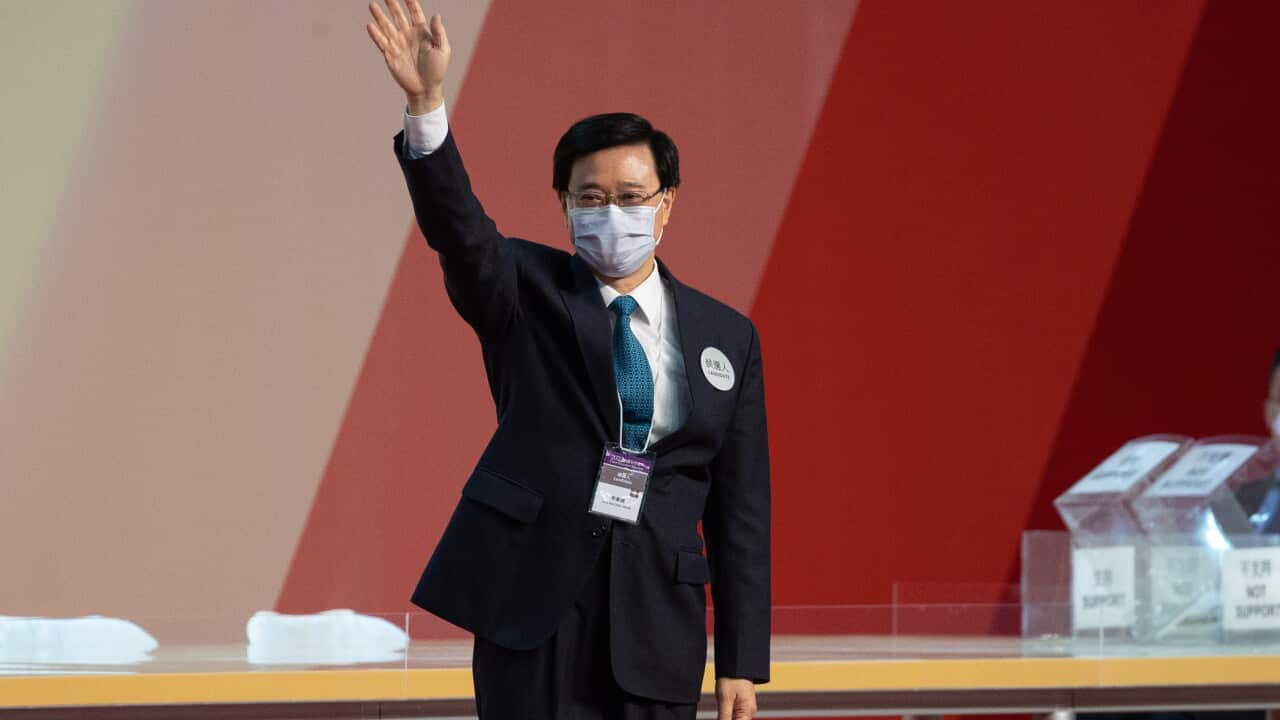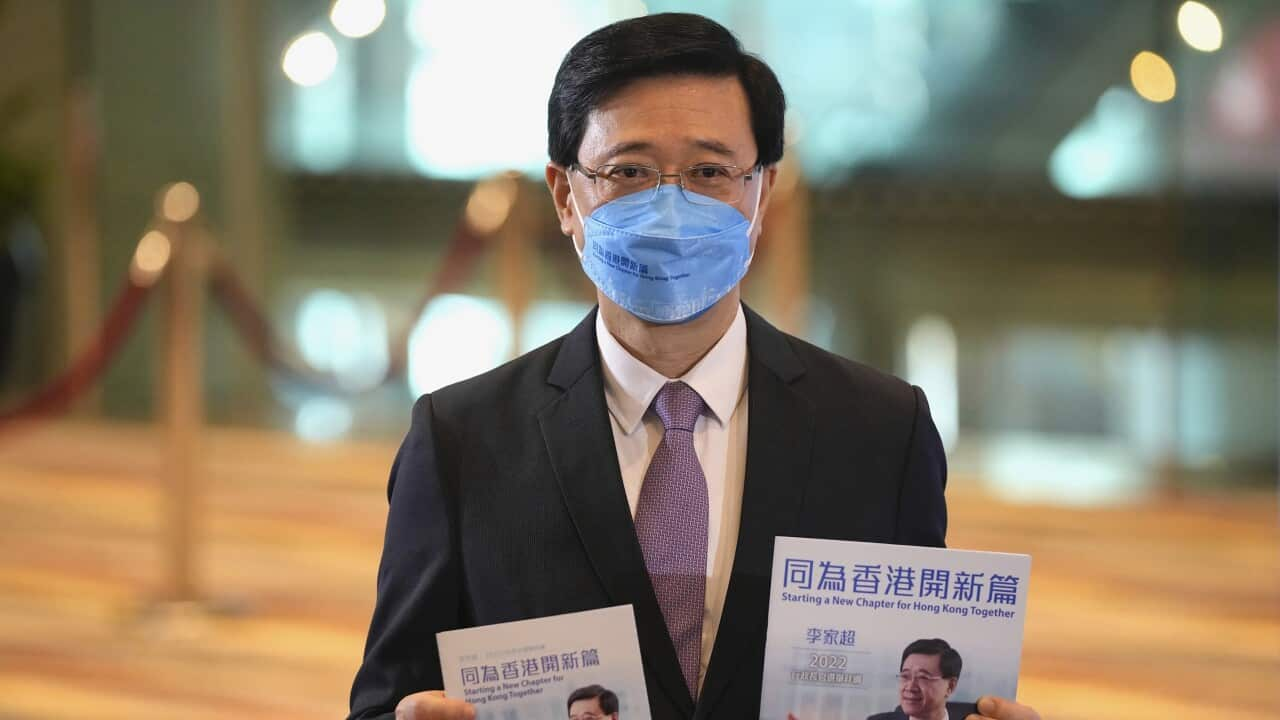The announcement of Hong Kong's new chief executive on Sunday was a stark reminder to many Hongkongers about the absence of a democratic process in the former British territory.
Nearly 1,500 largely pro-China members voted in a two-and-half-hour secret ballot to determine Hong Kong's chief executive.
There was only one candidate – John Lee – a former Hong Kong secretary for security, endorsed by the Chinese government in Beijing.
Speaking to SBS Chinese, Ted Hui - a former member of the Hong Kong Legislative Assembly now living in self-exile in Australia - said the process was undemocratic and does not take into account the views of Hong Kong citizens.
“The chief executive to be chosen is directly an order from Beijing. And it's chosen by a small circle of elites in Hong Kong,” Mr Hui said.
“I personally wouldn't call it an election. It is a selection by Beijing by a decree.
“So it has nothing to do with Hong Kong, so Hong Kong has generally felt irrelevant from the so-called elections. It has no democratic elements at all.”
Mr Lee's elevation places a security official in the top job for the first time after a tumultuous few years for a city battered by political unrest and debilitating pandemic controls.
Despite the city's mini-constitution promising universal suffrage, Hong Kong has never been a democracy, the source of years of public frustration and protests since the 1997 handover to China.
The election process follows major changes to Hong Kong's electoral laws last year. Now, only those loyal to the Chinese government in Beijing can seek office.
The legislature was also reorganised to eliminate opposition voices, as part of a broader push by the Chinese government under the leadership of Xi Jinping to crack down on freedoms in traditionally more liberal Hong Kong, which many decry as a violation of the so-called "one country, two systems" policy.
In his acceptance speech, 64-year-old Mr Lee, nominated for the job last month, expressed the opposite.
"This year marks the 25th anniversary of Hong Kong's return to the motherland,” he said.
“We must continue to ensure the comprehensive and accurate implementation of the 'one country, two systems' principle under which the Hong Kong people administer Hong Kong with a high degree of autonomy.
“Having restored order from chaos, it is high time Hong Kong starts a new chapter of development in the next five years.
“We are at a time of great opportunities as well as challenges."

Mr Hui was at the centre of demonstrations against Beijing-backed laws that Hong Kong pro-democracy activists say stifle their freedoms. Source: AFP, Getty / Getty Images/AFP
"I will safeguard the constitutional status entrenched by the Constitution and the Basic Law, buttress the core value of the rule of law, adhere to the bottom-line thinking, protect Hong Kong from internal and external risks and destruction, in order to ensure social stability in Hong Kong and safeguard national sovereignty, security and development interests."
Chinese state-controlled media in Beijing is hailing Mr Lee's election, although a radio broadcast did admit revitalising the economy and improving people's livelihoods will be an exhausting task.
Mr Lee, who will take office on 1 July said his approach would be result-oriented.
"I propose a result-oriented approach to establish a government with more responsibility, stronger teamwork and greater commitment to solving problems via bold thinking," he said.
While there was little dissent inside the Hong Kong Convention Centre – Mr Lee even received flowers after winning the vote – there was more outside.
Dickson Chau is the vice-chairperson of the League of Social Democrats, a local activist group.
They protested outside, handing out flyers and holding banners before police arrived and cordoned them off.
Mr Chau said the fact that ordinary Hongkongers didn't get a vote, meant there would be more bad news going forward.
"Now, none of us here are able to vote for the chief executive, but he is able to decide the destiny of Hong Kong,” Mr Chau said.
“Will our fundamental rights keep deteriorating, like the past few years?"
Luke Wong, a 27-year-old local resident, says there's little that Hongkongers who aren't happy can do except get out of the city, if they can.
"I have no anticipation for the next government,” Mr Wong said.
“I believe the incoming government will implement policies with greater thoroughness.
“We can only accommodate them.
“We have limited ability to leave Hong Kong and can only live with them.
“If you choose to stay, there is no way out. If you have the option to leave Hong Kong, then you should go."
Back in Australia, Mr Hui said he appreciates the Australian government’s historic support for democracy in Hong Kong, but has called for more sanctions on China.
“The Australian government has already given money and a lot of support in the past, and I'm grateful for it,” Mr Hui said.

Protesters take part in a march on a street in Hong Kong on 21 July 2019. Source: AAP
“I hope that in the future, there will be stronger measures, for example, sanctions, no matter if they are targeted individual sanctions or economic sanctions. Because now Australia has the tool to punish those human rights abuses in Beijing and in Hong Kong,” he said.





